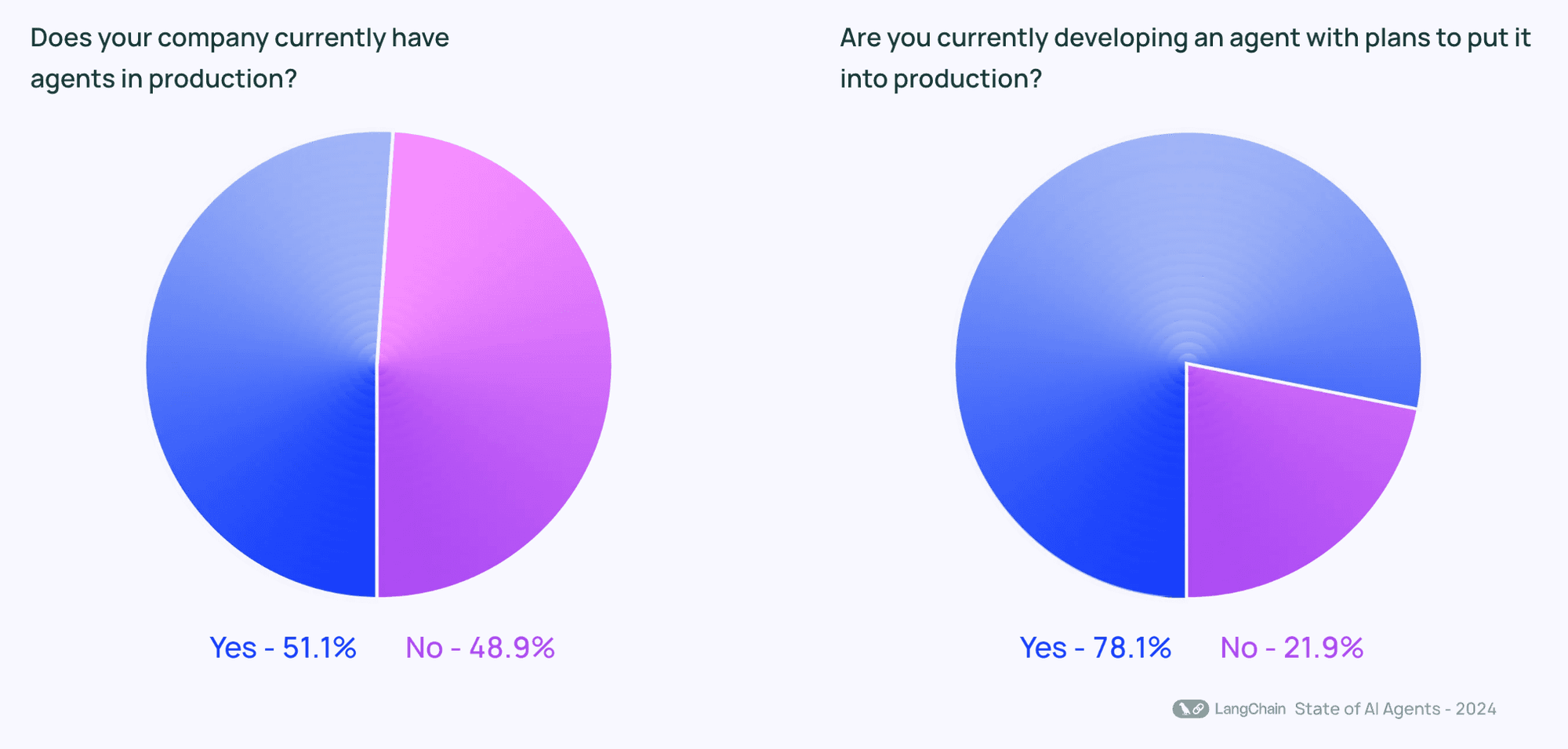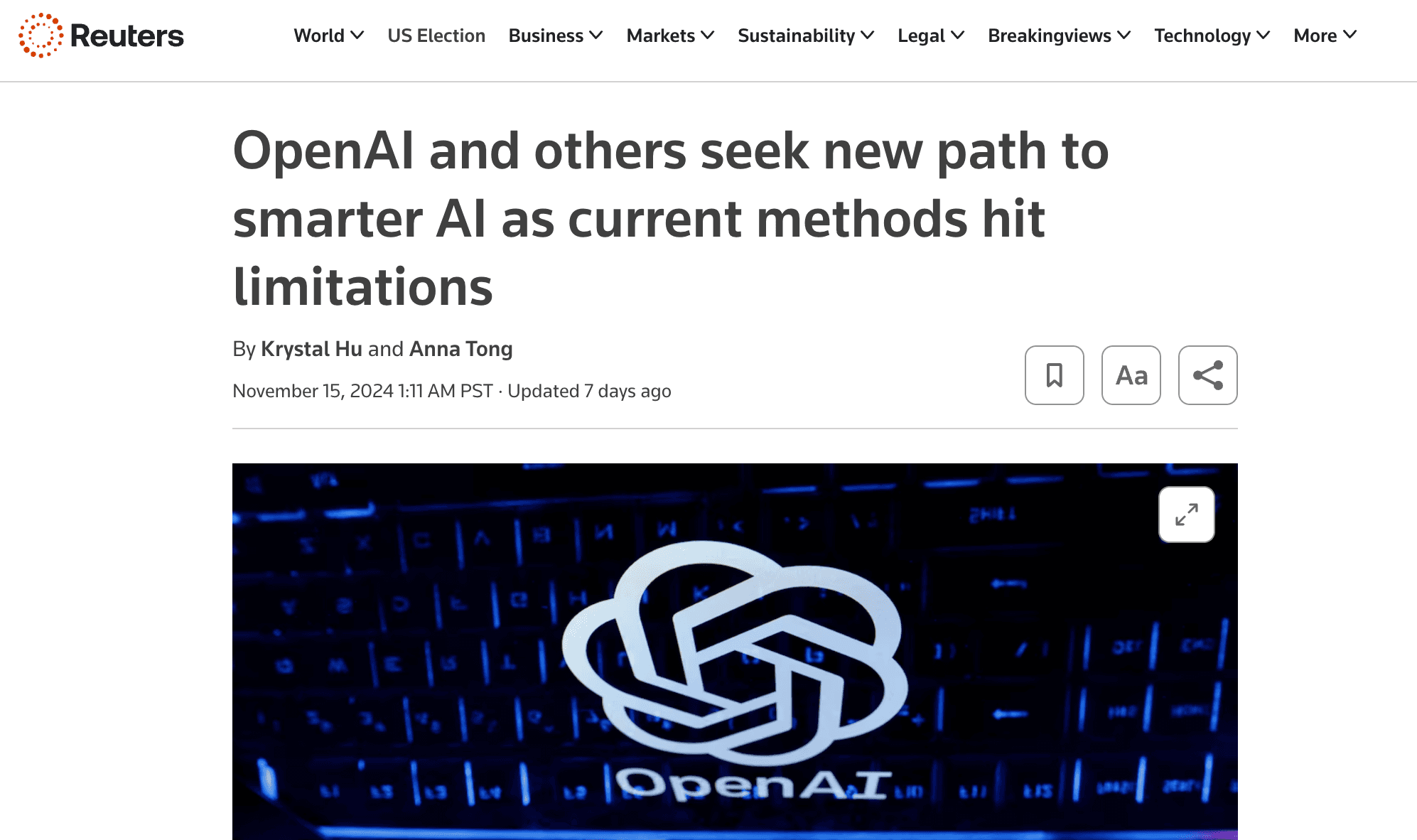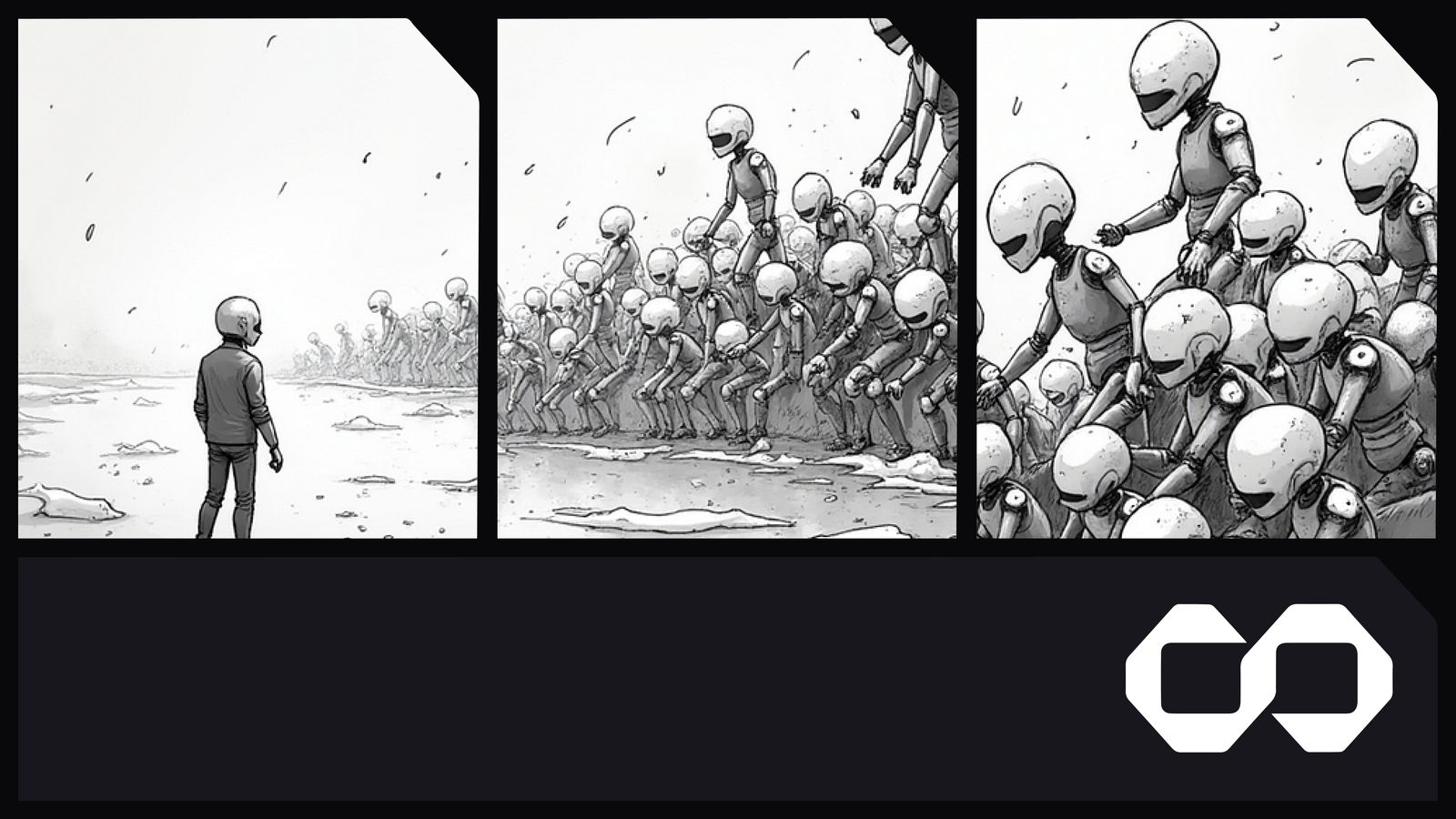This Week in AI, My 3 Cents: Agents, Coding, & AI Progress
Everyone has a plan until they get punched in the mouth by an AI agent
-Mike Tyson (probably)
This week, we're diving into why everyone's obsessed with agents (and whether they should be), the range of options available to code with AI (and learn how to code), and is AI progress slowing down?
We're seeing theory meet reality – and reality is winning.
Here's what you need to know, what everyone's getting wrong, and most importantly, what you can do about it.
Agents: Everyone's Building Them, No One Agrees On What They Are
The AI world has a new favorite buzzword, and it's giving "AI" itself a run for its money. Companies are racing to build agents, VCs are throwing money at them, and everyone seems to have a different definition of what they actually are. But beneath the hype, there's something real happening – and you need to pay attention.

State of AI Agent Adoption
What Happened This Week
LangChain Survey Reveals Mass Adoption: 78% of surveyed developers are currently building an agent to release. They define agents as "systems using LLMs to decide application control flow"
Stripe Joins the Party: Released their agent toolkit, making it easy to integrate Stripe into popular agent frameworks
a16z Stakes Their Claim: Positioned agents as "RPA 2.0" – suggesting they'll fulfill the original promise of robotic process automation
11x Raises $50M Series B: Bold stance: "We don't build software. We build digital workers. We're turning code into labor"
Google DeepMind Raises Ethics Concerns: New podcast discussing balancing user autonomy with risks of AI-enabled deception
My Take
People talk about keeping humans in the loop, but let's be real – where they can, people will automate. That's not necessarily bad, but it means we're heading toward a future where we'll need specialists who can debug these AI systems when they inevitably go sideways. The good news? Just like AlphaGo led to humans becoming better at Go, working with AI agents will likely make us better at understanding and managing complex systems.
In that world there’s a huge opportunity for building tools designed for these agents to use. We are seeing early experiments with proposals to standardize on using an /llms.txt file to provide information to help LLMs use a website at inference time. Also in the crypto world, Truth Terminal and Aether are autonomous agents throwing around tokens and people can’t stop watching; this may well have pushed Stripe to release their agent toolkit.
The most practical way to think about agents: if there's something you do manually and frequently, and it doesn't spark joy (hey, Marie Kondo), an agent might be your answer. But start small. Think "cogs" before "gods" – research, summarization, and data transformation are your friends. Customer service? Maybe pump the brakes.
What You Can Do Today
Beginner: Try ChatGPT's new search capabilities in chat. They've added up-to-date information and visual designs for weather, stocks, sports, news, and maps. It's a gentle introduction to seeing an AI agent interact with external tools.
Intermediate: Work through LangChain's "Build an Agent" tutorial to search online for you. Nothing beats hands-on experience for understanding what agents can (and can't) do.
Advanced: Follow Lingzhen Chen's tutorial on streamlining research and presentations with LlamaIndex Workflows. It's a practical example of using agents for real-world knowledge work.

Generated Slides from "How I Streamline My Research and Presentation with LlamaIndex Workflows"
Don't Know How to Code? Using AI It's Never Been Easier.
Know How To Code? Congrats, You Have Superpowers Which Will Continue To Grow.
$4 million in 4 weeks. That's how much revenue Bolt.new generated by letting anyone create web apps through conversation. Meanwhile, traditional coding tools are getting AI superpowers that would make Tony Stark jealous. The coding landscape isn't just evolving – it's having a revolution, and everyone from Beginner <-——> Staff Software Engineer are invited to the party.

StackBlitz Demo https://x.com/TheHeroShep/status/1855004049365750254
What Happened This Week
Bolt.new Shows Autopilot's Potential: Anthropic case study reveals $4M ARR in just 4 weeks. Their Claude-powered platform lets complete beginners create sophisticated web apps through natural conversation, cutting development costs by 99%some text
And a new interview: Bolt tutorial for beginners with the Bolt CEO Eric Simons
Power Users Get a Boost: Cursor (fresh off a $60M Series A) merges with Supermaven ($12M raised in September) to build the ultimate technical IDE. Combined team focusing on "models with new capabilities co-designed with the user interface"some text
Codeium Finds the Middle Ground: Launched Windsurf Editor, bridging autopilot and copilot approaches. Non-engineers on their team built everything from Wordle clones to quoting tools, while keeping developers in flow state
DIY Option Emerges as Chinese Teams Continue Open Source Surge: Alibaba's Qwen team releases Qwen2.5-Coder series, matching GPT-4's coding abilities. Open-source models range from 0.5B to 32B parameters, this means you can run them locally without sending anyone your data!\* (On a powerful Mac or NVIDIA machine)
My Take
This isn't just about making coding "easier" – it's about removing barriers between ideas and execution.
The $4M ARR from Bolt.new in just four weeks tells us what we already knew: people have ideas(!) they want to build but didn’t know where to start or couldn't justify the traditional development costs. Now the only barrier to starting is having an idea.
With that said, we're seeing a beautiful spectrum emerge: Bolt.new for the "just ship it" crowd, Cursor/Supermaven for the technical specialists, and Windsurf finding the sweet spot in between. This is great because we’ve seen studies show that while generally AI benefits ‘are greater for individuals with relatively lower ability’ for specialized work like scientific discovery ‘the bottom third of scientists see little benefit, the output of top researchers nearly doubles.’ AI really is a general purpose person amplifier.
The Cursor/Supermaven merger signals something deeper too. We're going to see more consolidation as teams realize it's better to acquire passionate specialists than build everything in-house.
The open-source release of Qwen2.5-Coder is just as telling. Yes, you can now match GPT-4's coding abilities locally if you have the hardware – but most teams will still choose the convenience of cloud APIs. We're entering an era where you can choose anywhere on the spectrum from maximum convenience (at a price) to complete control (with more setup work).
What You Can Do Today
Just Starting Out:
Download the ChatGPT app and try voice mode. Having natural conversations with AI is one of the best ways to build intuition about how they think. Ask it to explain concepts you're curious about, then ask follow-up questions or just bounce ideas back and forth
Next up? Ask your boss if you can experiment with AI tools at work. Frame it as a learning opportunity – you'd be surprised how many leaders are curious but haven't taken the plunge.
Already Using AI Daily:
Level up your prompting game with Claude's new prompt improver. It's like having a prompt engineering mentor look over your shoulder. Upload your existing prompts and watch how it suggests improvements – you'll start seeing patterns you can apply everywhere.
Get weird with your prompts! Break conventional formats, try roleplay scenarios, experiment with different writing styles. The best way to understand these models' capabilities is to push their boundaries.
Art More Your Speed?:
Test drive Bria's Background Removal 2.0 or MagicQuill for image editing. These tools showcase how specialized AI is evolving beyond general models.
Browse Hugging Face Spaces – it's like an app store for AI experiments. Find something that sparks your curiosity and play with it.
Remember: The goal isn't to master everything, but to find the specific areas where AI can amplify your existing skills and interests.
So... Is AI Progress Slowing Down? (Spoiler: It's Complicated)

The headlines are getting spicy: Reuters says we're hitting limits, while Google's Gemini just crushed every benchmark. The cost of running these models is in freefall, yet training them is getting harder. Welcome to the most interesting identity crisis in tech, lets break it down.
What Happened This Week
Reuters Drops a Bombshell: Ilya Sutskever (founder of OpenAI who recently left to found a competitor Safe Superintelligence 🤔) declares "the age of scaling" over, citing plateaus in pre-training and data exhaustion
Google Answers With Action: Google released a new model Gemini (Exp 1114) claims #1 spot across technical and creative domains, matching GPT-4, surpassing Claude-3, and continuing the trend of atrocious naming of models
a16z Shares the Economics: LLM inference costs dropping 10x yearly - faster than PC revolution or dot-com bandwidth boom
Every.to Provides Context: Argues AI isn't slowing down, just switching paradigms - like a toddler moving from walking to talking
Visual AI Keeps Advancing: Bria drops state-of-the-art background removal 2.0, while Ant Group releases MagicQuill for image editing
My Take
The headlines about AI progress slowing miss the bigger picture. Think about how human knowledge evolved: from basic electricity concepts in the 1600s to semiconductors in the 1940s. Each breakthrough built on previous work, often in unexpected ways. That's where we are with AI – not hitting a wall, but discovering new paths forward.
The economics paint a clear picture: inference costs dropping 10x yearly means more use cases become viable every day. Even if model capabilities plateaued today (they won't), we'd still see an explosion of practical applications simply because what was expensive yesterday is cheap today. I truly believe that the next wave of software will be driven by subject matter experts using AI to solve real problems they understand better than anyone else. It wont matter whether they’re in a well funded research lab in Silicon Valley, their parents basement, or a vineyard in France.
I think these models are maturing into instruments rather than just tools. Like a musician who knows exactly how to get the right notes from their guitar, the best results come from developing intuition and finesse. When you get a bad response, it's rarely because AI "can't" do something – it's usually because the prompt needs refinement. This isn't a limitation; it's an invitation to develop and showcase mastery.
Now the question is, what is worth mastering to you?
What You Can Do Today
Just Starting Out
Download the ChatGPT app and try voice mode. Having natural conversations with AI is one of the best ways to build intuition about how they think. Ask it to explain concepts you're curious about, then ask follow-up questions or just bounce ideas back and forth
Next up? Ask your boss if you can experiment with AI tools at work. Frame it as a learning opportunity – you'd be surprised how many leaders are curious but haven't taken the plunge.
Already Using AI Daily
Level up your prompting game with Claude's new prompt improver. It's like having a prompt engineering mentor look over your shoulder. Upload your existing prompts and watch how it suggests improvements – you'll start seeing patterns you can apply everywhere.
Get weird with your prompts! Break conventional formats, try roleplay scenarios, experiment with different writing styles. The best way to understand these models' capabilities is to push their boundaries.
Art More Your Speed?
Test drive Bria's Background Removal 2.0 or MagicQuill for image editing. These tools showcase how specialized AI is evolving beyond general models.
Browse Hugging Face Spaces – it's like an app store for AI experiments. Find something that sparks your curiosity and play with it.
Remember: The goal isn't to master everything, but to find the specific areas where AI can amplify your existing skills and interests.
Conclusion
If there's one theme emerging from this week's developments, it's this: AI is becoming less about the technology and more about what you want to do with it. The barriers to creation have never been lower, but the ceiling for expertise has never been higher. The best time to start was 10 years ago. The second best time is today.
The tools are ready, the only question is: what will you build first?




